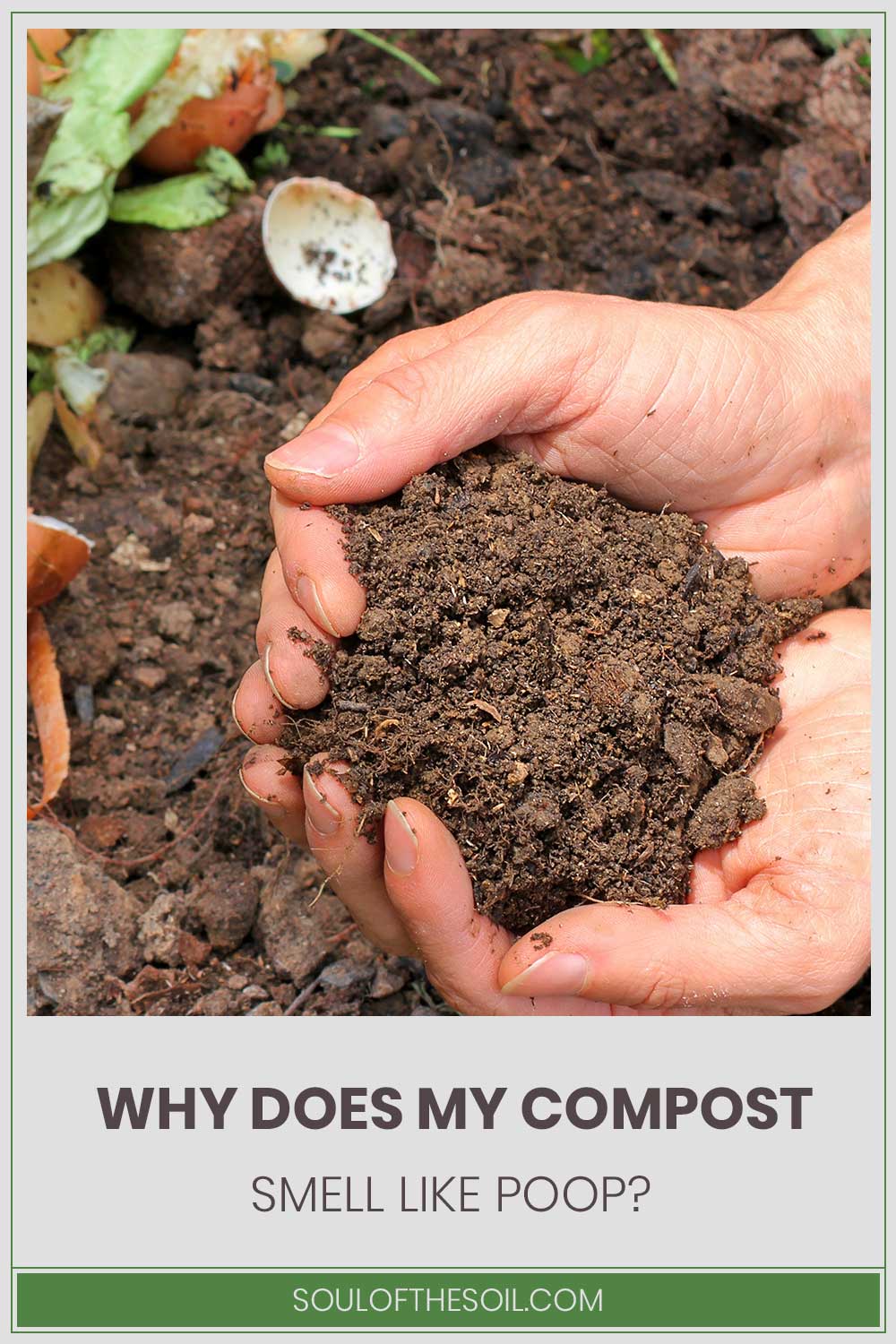Why does my compost smell like poop?
We may earn commissions for purchases made through links on our site. Learn more on our about us page.
When it comes to biodegrading, most foods with fats and lipid tissue will clog air passages which then shut down the aeration process, and just like being compacted, the compost will stink.
In addition to this, overly wet or soaked compost heaps will harm the beneficial microorganisms and insects, creating more of an anaerobic environment.
In general, the issues with the stinking compost will require drying and airing out the soils to ensure that molds and harmful bacteria are not allowed to cultivate a home.
In this article, we will explore solutions to stinking compost and also help share ideas that other successful composters have done.

Why Does it Happen?
There are a few situations and reasons for a healthy compost to turn stinky or for a new compost to turn anaerobic in the beginning. The best part about compost is that you can restart it at any time, and soils are not harmed by a shovel or heat lamp.
The most common reason for compost becoming anaerobic is rainstorms, non aerated bins, and heap areas.
The moisture from the rain can collect inside plastic bins, and the polarity of the water molecule will then pull the soil together and, in effect, shut off oxygen to the inner portions of the compost.
How Can You Prevent the Smell?
The most important thing to remember for preventing this stink is to have a dry space for the compost; a shelter or irrigation strategy that allows excess water to drain out of the bin or heap will be the most effective step in preventing molding and stinking anaerobic processes.
In addition, the healthy aerobic composting process requires limited amounts of moisture and bountiful amounts of oxygen to keep things at the beneficial microorganism’s homeostasis.
The one control that a composter has is not mixing dairy, meats, or other oils and lipids into the compost; these items break down and decompose in a way that the matter becomes almost gelatinous, which plugs air passages and encourages harmful bacteria cultivation.
What Should a Healthy Compost Smell like?
There is going to be a different aroma. A working compost will have an earthy smell similar to that of a fresh garden bed after being watered.
Or the smell a forest has after a cleansing rainfall. There will be a pleasant, almost sweet smell that goes along with the strong earthy scent.
In most cases, the stinking compost will be a sign that something has gone wrong within the heap, but healthy, working composts will have an odorless existence.
Keep this in mind when you decide to mix in certain fruit skins, veggie cuttings, or other leftovers into the compost heap.
Can You Fix Compost that Smells like Poop?
The rule of thumb or guideline for stinking compost is to catch it before it gets worse. At the first sign of stinking, take a shovel and break the soil up to allow the wet portions of the heap to dry and mix up the organic materials.
If you have reached the point of an outhouse stench, do not fret; there will still be a way to save the day and fix the heap from a catastrophic anaerobic situation.
First, you will need to break apart the dirt clods, spread the soil out thinly across an open space, and allow the dirt to dry completely.
Is it Okay to Use Smelly Compost?
This will be a flat-out no; do not use smelly compost for anything food related because of the hazardous bacteria that are normally associated with these anaerobic environments.
For example, E. Coli and Salmonella thrive in anaerobic habitats and quickly set up shop in these compost sets, to which we all know this bacterium can kill a human.
When a smelly compost is used to revitalize a lawn space, the sun will dry out the soil, thus eliminating the majority of the harmful bacteria; enough so to be safe enough to use outside, but do not use this compost indoors.
Final Thoughts on Why does Your Compost Smell like Poop
Compost systems need daily causal checks, along with some elbow grease during setup and when extracting bottom layers for harvesting and utilization in the fields and gardens.
These systems are invaluable to folks living off-grid, in rural areas, or working in the dirt for a living.
Remember to avoid meats, dairy, and other lipid foods. Better to give these items to the animals.
Certainly, the dogs or pigs will be extremely willing to help in this regard. Otherwise, be sure to mix in those organic leftovers, especially fruits and sweeter-smelling plant materials such as flowers.



Leave a Reply
You must be logged in to post a comment.